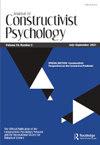Why Do We Have Internal Dialogues? Development and Validation of the Functions of Dialogues–Revised Questionnaire (FUND-R)
IF 0.7
4区 心理学
Q3 PSYCHOLOGY, CLINICAL
引用次数: 2
Abstract
Abstract People are often engaged in internal dialogues. It means that they adopt (at least) two different viewpoints and the utterances formulated (silently or aloud) from these viewpoints respond to one another. Internal dialogues fulfill several important functions. However, this complexity has not been reflected in how the functions of internal dialogues are measured and investigated. To provide a more nuanced picture of the functions of internal dialogues, we developed the Functions of Dialogues–Revised Questionnaire (FUND-R). Study 1 aimed to explore (n = 248) and confirm (n = 538) the internal structure of the FUND-R. Study 2 (n = 341) was designed to reconfirm this structure and examine reliability and validity of the method. In Study 1 the FUND-R has been confirmed to have six subscales, measuring six functions of internal dialogues: Analyzing, Bonding, Self-Knowing, Fantasizing, Ruminating, and Testing. Study 2 reconfirmed the structure and revealed high reliability and validity of the FUND-R. Validity was assessed via convergence with personality traits, two types of self-attentiveness, and stress-coping styles. The analysis of criterion validity also included comparison of FUND-R scores across different interlocutors, and situations discussed in dialogues. The FUND-R has been confirmed as a reliable and valid measure of functions of internal dialogues for use in research settings.为什么我们要进行内部对话?对话功能的开发和验证——修订问卷(FUND-R)
摘要人们经常进行内部对话。这意味着他们采用(至少)两种不同的观点,从这些观点形成的话语(无声或大声)相互回应。内部对话具有几个重要功能。然而,这种复杂性并没有反映在如何衡量和调查内部对话的功能上。为了更细致地了解内部对话的功能,我们开发了对话的功能——修订问卷(FUND-R)。研究1旨在探索(n = 248)和确认(n = 538)FUND-R的内部结构。研究2(n = 341)是为了再次确认该结构并检查该方法的可靠性和有效性。在研究1中,FUND-R被证实有六个分量表,测量内部对话的六种功能:分析、联系、自我认知、幻想、沉思和测试。研究2再次确认了该结构,并揭示了FUND-R的高可靠性和有效性。通过与人格特征、两种类型的自我注意和压力应对方式的趋同来评估有效性。标准有效性分析还包括比较不同对话者的FUND-R得分,以及对话中讨论的情况。FUND-R已被确认为在研究环境中使用的内部对话功能的可靠和有效的衡量标准。
本文章由计算机程序翻译,如有差异,请以英文原文为准。
求助全文
约1分钟内获得全文
求助全文
来源期刊

Journal of Constructivist Psychology
PSYCHOLOGY, CLINICAL-
CiteScore
2.40
自引率
0.00%
发文量
22
期刊介绍:
Psychology and related disciplines throughout the human sciences and humanities have been revolutionized by a postmodern emphasis on the role of language, human systems, and personal knowledge in the construction of social realities. The Journal of Constructivist Psychology is the first publication to provide a professional forum for this emerging focus, embracing such diverse expressions of constructivism as personal construct theory, constructivist marriage and family therapy, structural-developmental and language-based approaches to psychology, and narrative psychology.
 求助内容:
求助内容: 应助结果提醒方式:
应助结果提醒方式:


